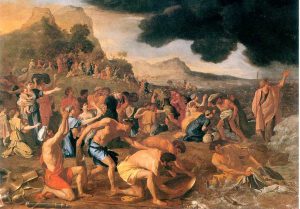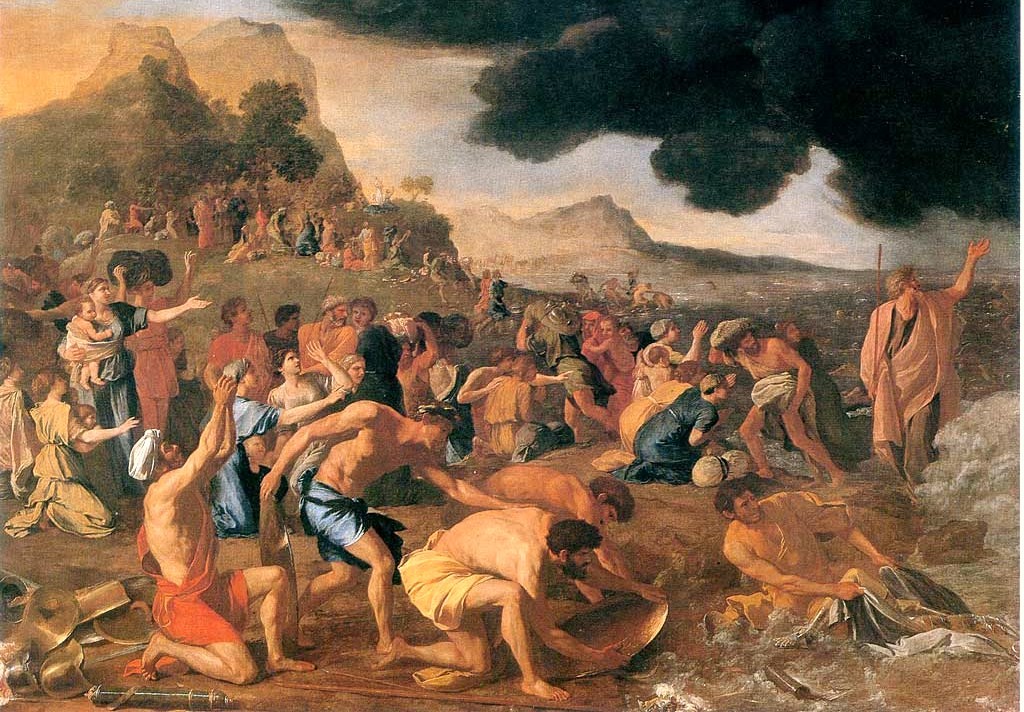
Meek Moses and the people of Israel at the Red Sea shore.
Blessed are the meek, for they will inherit the earth (Matthew 5:5).
Only one sentence in the Old Testament describes a character as “meek.” Given the way we use the term, one expects someone nameless, lowly, or even a loser. But to the contrary:
Now the man Moses was very meek, above all the men which were upon the face of the earth (Numbers 12:3, KJV).
Ironically, the verse elevates Moses for his meekness and humility. His meekness makes him a leader, a winner, a man with a name remembered for all time.
For Jews, Christians, and Muslims, Moses serves as the archetypal leader, prophet, and liberator. As leader of the people of Israel out of slavery and Egypt and through the wilderness toward the Promised Land, he is the central human character in one of the most epic events in the human story.
Yet, his meekness, not hubris, made him the man for the job. Moses knew that he was indeed a human character in the drama and that God was the main character.
When God called the shepherd fugitive to take on this politically impossible role, Moses responded meekly, “Who am I that I should go to Pharaoh, and bring the Israelites out of Egypt?” God answered, “I will be with you” (Exodus 3:11b-12a).
That brief exchange captures the essence of meekness: Standing before God, Moses recognizes his own weakness and insignificance. Yet, all things are possible because God is with him.
Ten plagues and a Passover later, the slave nation treks by night in the wilderness, the Red Sea before them, the Egyptian army pursuing behind, and God with the Israelites, lighting the night and shielding them. And Moses leads, holding the staff through which God wields power.
When they reach the lapping waves of the sea, Moses looks to God for help, and God orders him the lift the staff and his hand to part the waters. And given the way the narrator tells the story, that seems odd and unnecessary. For he depicts God doing all the damage, parting the waters, making the Egyptians pursue against their better judgment, jamming their chariot wheels in the wet sand, and enveloping them in the deep sea. Meanwhile, the tired former slave nation plods safely to the other side (Exodus 14:15-31).
Moses might ask, “Why was I necessary in all this?” Only God knows. But meek Moses does not get hung up on the question. For the meek see through human attributions and explanations to the hand of God at work. The meek attribute their good deeds to the power of the God who sent them. As Paul said,
We have this treasure in clay jars, so that it may be made clear that this extraordinary power belongs to God and does not come from us (2 Corinthians 4:7).
Moses and the crossing of the Red Sea make larger-than-life theater. The spectacular story tempts us to sit back and watch as mere spectators. Yet, the ways of God and the meek play out in similar ways in ordinary lives like yours and mine. After all, God loves us as God loved Moses and Israel, and God hears our groans and prayers and sends us on our small journeys to freedom. When the mission appears overwhelming, God bids us assert ourselves although we know our smallness. If we are like meek Moses, we obey because we know God is with us, and a loving power greater than ourselves will finally get us home.
Related Posts
Salt and Light: How Humility Empowers Love
An Apology for Caspar Milquetoast
The Comic Beatitude
Courage to Hope: How the Third Beatitude Changed Me
Image: The Crossing of the Red Sea by Nicolus Poussin, 1633-34. Public Domain.


0 Comments